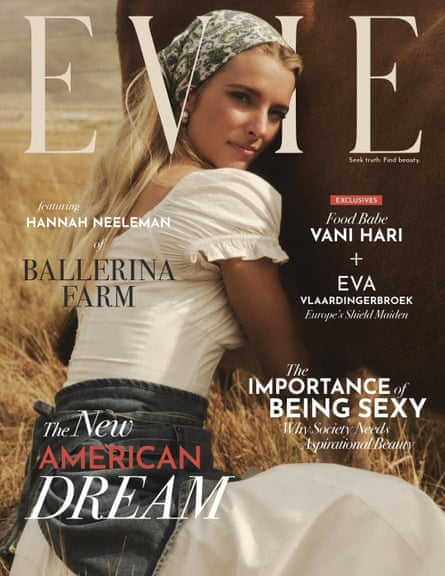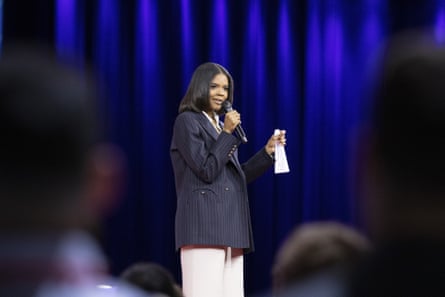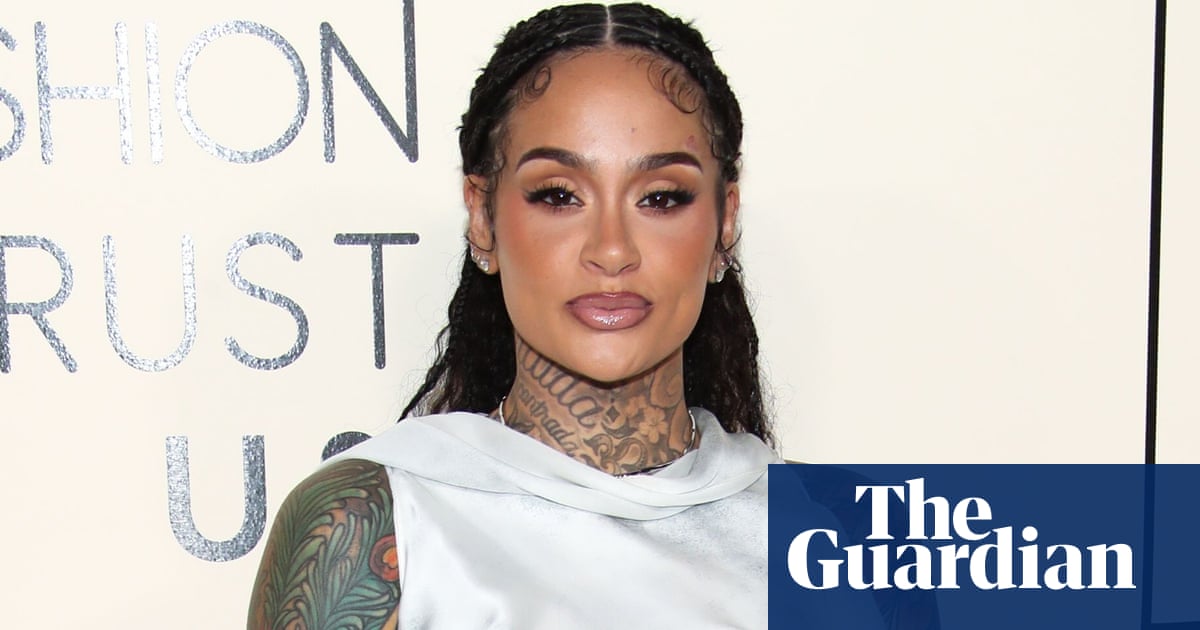On the most recent episode of her YouTube show, the rightwing commentator Brett Cooper joined the rest of the world in jeering Katy Perry, Gayle King and Lauren Sánchez’s brief flight to space.
“These women were completely dependent on men who built this spacecraft,” she said with a cheeky smirk. “Frankly, we all are, because men built civilization. They built the homes that we live in, they built the studio that I am recording in … the spaceships that all of these rich celebrities are flying around in.” The difference between Cooper and feminists, she says, “is I choose to acknowledge that and celebrate it and be grateful”.
The Blue Origin flight was prime fodder for Cooper, a bubbly, fast-talking 23-year-old with silky espresso brown curls and colorful Pinterest-friendly prints on the wall behind her. She posts biweekly videos commenting on hot-button social and cultural issues. Thumbnails on YouTube depict her – eyebrows raised quizzically, mouth agape in faux surprise – alongside titles like SNOW WHITE EPIC FAIL and CAPTAIN AMERICA HATES AMERICA? in yellow all caps. These cultural flashpoints serve as her evidence that young women are finally “waking up” to the lies feminism has apparently told them.

There is a sizable audience for Cooper’s brand of disarming anti-feminist content. She had the second-fastest growing political YouTube channel in the first quarter of 2025 with over 900,000 new subscribers, according to data analyzed by researcher Kyle Tharp. Her Spotify audience is about 60% female, a spokesperson told Semafor.
Analyses of the 2024 election widely heralded the “manosphere” – the coalition of bro podcasters and YouTubers popular with male audiences – as key to delivering Donald Trump’s victory. According to an AP poll, 56% of men under age 30 went for Trump compared with 41% four years prior. By meeting young men where they were at, Trump and his surrogates were able to reach voters who are typically among the least politically engaged segments of society.
Now, there are the beginnings of an organized effort to create a similar alternative rightwing media ecosystem targeting young female US audiences – one of the few demographics that has, until now, leaned substantially Democratic.
This new “womanosphere” includes Cooper’s channel as well as lifestyle magazines like the Conservateur and Evie, Candace Owens’s Club Candace, Alex Clark’s Maha (“Make America Healthy Again”) talkshow Culture Apothecary, conservative Christian influencer Allie Beth Stuckey’s Relatable, and swimmer turned anti-transgender activist Riley Gaines’s podcast Gaines For Girls. Draw the circle a bit wider and you get the “tradwives” posting homemaking content on Instagram, the edgelord It Girls of Red Scare, and “femcel” influencers positioning themselves as the female answer to Tate.
While the women behind these outlets all have different styles and tactics, they are mostly aligned in their desire to return to a gender-essentialist worldview: women as submissive homemakers, men as strong providers.
Like the manosphere influencers, these outlets are animated by a grievance against “wokeness” and the belief that conservatives are the real oppressed minority. They claim that the liberal media and Hollywood are promoting feminist propaganda, and so they must fight back.
Though they present themselves as independent thinkers, their ideology lines up neatly with the Trump administration’s quest to dismantle reproductive rights, roll back protections for LGBTQ+ people, and advance an anti-science agenda that puts the health of millions of Americans at risk.
It’s not only rightwingers who have gripes with contemporary feminism. Many on the left have been critical of shallow “girlboss feminism” (the bipartisan backlash to the embarrassing Blue Origin flight being a case in point), noting that impossible expectations are placed on women in a crassly capitalist society that offers little support for working mothers. According to a 2023 survey run by the non-profit Catalyst, four in 10 women said they felt they would need to change jobs in order to manage childcare demands, and the US is still the only rich country in the world without a national paid parental leave policy. Yet for this new womanosphere, the response is not advancing policies like paid family leave or affordable childcare, but to return to an idealized, illusory past where being a wife and mother was viewed as a woman’s sole purpose.
Young women are particularly vulnerable to these appeals. Like their peers in the manosphere, these commentators are capitalizing on a real crisis of loneliness and economic precarity facing gen Z. “Social media has truly given gen Z a warped sense of reality,” said Cooper, who has described dating apps as “treacherous” and a “barren” landscape.
The alternative vision these influencers are proposing is scarily retrograde and would strip women of their freedom and economic independence. “You want to go back and sit in a cubicle when you could have this, like, beautiful amazing child that you’ve created with the love of your life?” Cooper asked rhetorically on a recent podcast appearance.
Instead of trying to have it all, women, she said, need to change their priorities because “if you aren’t going to the gym, if you aren’t taking care of yourself, if you don’t like children, if you only care about your career, and you hate the patriarchy” then a desirable man is “not going to go for you”.
The type of woman these commentators valorize is thin, straight, fertile, traditionally feminine, conventionally attractive to men and white – though they try to avoid overt racism, instead opting for sentiments like, “as a minority woman, I’m here to say that you’ll be happier and more fulfilled if you aren’t consumed by thinking about your race.” Anyone who falls outside of this narrow mold is subject to relentless mocking and disparagement. Though they have different tactics and tones, like their cohorts in the manosphere, they play with the idea that calling women fat or ugly is fun and transgressive – framing it as part of a virtuous quest to rid society of woke, feminist ideals.

Young women have been hailed as the saving grace of the Democratic party, the force that will deliver us from all those angry young men spending all their time listening to podcasts, but that’s not a given. While young women still went blue in 2024, Joe Biden’s 35-point lead in 2020 dwindled to a 24-point lead for Kamala Harris. Other demographics, like Black and Latino men, broke with historical trends to shift to the right this election. Emily Amick, an influencer and political analyst who has been observing the trend on her Substack, said that people might underestimate the womanosphere’s impact at their peril. “What we saw in the 2024 presidential election was that the manosphere had a lot more impact than a lot of people expected,” Amick said. “I believe that the conservative movement is running the same play with women, and in 2028 we are going to see a massive impact of the messaging machines they have been building.”
A ‘conservative Cosmo’
Flipping through the homepage of Evie magazine – which launched online in 2019 and is now in print – you might mistake it for a regular glossy women’s magazine. There are pieces about the best nail color for fall and what to ask your stylist if you want Sabrina Carpenter’s hair.

But read deeper and you’ll notice that the Cosmo-esque sex tips about the art of oral sex and mastering cowgirl come with a disclaimer that they are “intended for married women” only. You’ll see headlines like Want Your Husband To Get You Pregnant? Cook Him These 10 Dishes and What Do JD Vance’s Blue Eyes And Sydney Sweeney’s Curves Have in Common? America Misses Classic Beauty And Wants It Back.
These pieces are written in a chatty, knowing tone designed to make it seem like everything they are saying is common sense, while dispatching their enemies with high school-bully cruelty. A recent piece called Why I Love Being A Hot Mom oscillated between glib declarations like “skinny sex is the best sex” and diatribes from the author about how she despises “mediocre motherhood” and the “lack of self-control, unattractiveness, and state of disease” that results from embracing body positivity. (Disagree with her? You’re probably a “sorry, sad, chronically online gutter goblin”.)
In the past two decades, mainstream women’s outlets have made attempts to emphasize overall wellbeing instead of outer beauty and valorizing thinness above all. Evie sees this as wokeness run amok. They want to bring back your mother’s – or your grandmother’s – women’s magazine, in which it was OK to celebrate a certain body type over others. “When we encounter a heavily tattooed, blue-haired, obese, gender-neutral individual with a bull-ring, that person is communicating to us that they actively disregard the standards for normality that the majority of people agree on,” read a 2021 piece titled Objective Feminine Beauty Is Not A Relic Of The Patriarchy.
Evie was started by married couple Brittany and Gabriel Hugoboom as a sort of “conservative Cosmo”. As Brittany Hugoboom told the New York Times in a March profile, their goal was to build a “one-stop shop for femininity” that runs counter to the “casual sex, careerism or ideological activism” she attributes to feminism.
Introducing TOXIC BREAKUP, the world's first 3-in-1 Birth Control Detox.
Developed by holistic doctors and leading hormone experts to detoxify, replenish, and restore balance to your hormones after getting off birth control.
Women everywhere are breaking up with their birth… pic.twitter.com/VGjSjTcpDr
In addition to Evie, the Hugobooms run a menstrual cycle wellness app backed by Peter Thiel that encourages fertility planning through cycle-tracking. Along with ads for the app in their print issue, their content frequently extolls the dangers of the pill and IUDs. “Our reproductive organs are made for just that – creating new life – not warding off sperm and altering our insides to make conception close to impossible,” read a recent Evie piece. Though some young women may recoil when conservative men like JD Vance and Elon Musk opine on birthrates and fertility, outlets like Evie are able to repackage a similar message in a more approachable way.
Maggie Bullock, a women’s magazine veteran who co-writes the Spread, a newsletter about the industry, said she saw outlets like Evie as trying to be something of a “gateway drug” into more extreme conservative ideologies. “Like, we’re nice and we’re pretty and we’re not that radical, don’t worry, we’re just telling you the truth,” she said. “It feels like a wolf in sheep’s clothing.”
Jessica Marie Baumgartner, a 41-year-old former Evie freelancer and self-identified “conservative pagan” mother of five based outside St Louis, Missouri, said that though she had written for other rightwing outlets before Evie, she was attracted to “being able to write specifically about women’s issues” like breastfeeding, home birth and home schooling. She was turned off by what she saw as an “obsession with sex” in mainstream women’s magazines. “They started writing articles about younger and younger sex, with younger and younger underage minors. And that was when I was just like, ew, what’s happening here?”
Baumgartner, like many of Evie’s writers, looks nostalgically to the past as a solution for society’s ills. “I think a lot of people are moving toward the conservative movement because we’re realizing that our grandparents had these very beautiful values that gave us a lot to look forward to,” she said. “We’re all working multiple jobs. We’re all so tired, we’re barely able to keep up with our kids. We barely know our neighbors. Everybody is so stretched thin because our values have shifted away from what really matters.”
Evie’s reach shouldn’t be overstated – it has 210,000 followers on Instagram, compared with Cosmopolitan’s 4m, and has only put out three print issues in four years – but they’re increasingly finding new ways to garner attention. The cover of Evie’s 2024 print issue featured Ballerina Farm influencer Hannah Neeleman – whose posts about homesteading and home schooling her eight kids on their Utah farm have garnered her 10 million Instagram followers – milking a cow in a bonnet and white peasant dress.
While quitting one’s corporate job to bake pies, milk cows and raise beautiful babies while wearing flowing nap-dresses may look like an appealing form of escapism, Bullock said this lifestyle propaganda was serving a much more sweeping and nefarious conservative agenda. As she put it: “If you’re going to tell a generation of young women that it’s bad to be a feminist, the Trump administration is pro-woman, that they should be having babies immediately and more of them and the pill is bad for them, that is a huge setback you’re proposing for American women.”
From Phyllis Schlafly in the 1970s, who helped mobilize young Christian women against the Equal Rights Amendment, to Ann Coulter and Moms for Liberty, women have long played a role in spreading conservative propaganda. But what sets these new voices apart is that they don’t all market themselves as political commentators. In this sense, they are cribbing from the success of the manosphere, which won new Maga converts in part because most of its leading figures weren’t explicitly partisan. Multi-hours-long podcast episodes and Twitch streams from the likes of Rogan, the Nelk Boys or Theo Von are typically much more weighted to cover sports, gambling, drugs and dating than they are to talk about which bill is passing in the Senate.
The leading voices of the womanosphere are using a similar strategy. As Brittany Hugoboom put it in an op–ed for the rightwing outlet Quillette: “Conservatives will never win if they imagine themselves as combatants atop defensive battlements, hurling abuse on the mass media. We need to involve ourselves in the creation of pop culture.”
But while Maga has piggybacked on the manosphere’s existing popularity in fields like wrestling and comedy, many of the loudest voices in the womanosphere have already been political media operatives. Cooper, Candace Owens, Allie Beth Stuckey and Alex Clark all have longstanding ties to conservative media outlets like the Blaze and the Daily Wire as well as the conservative activist group Turning Point USA, which was instrumental in turning out the vote for Trump.
Over the past few years, Turning Point has poured millions into cultivating an alternative rightwing media space. After the election, the group told the New York Times that they had incubated about 350 rightwing influencers. “We made long-term investments in creators and in influential voices that we believe will be the opinion shapers of tomorrow,” executive director Charlie Kirk told the outlet.
“Influencers are not advertisements. They are in the bathroom with you, they are holding your hand when you break up with your boyfriend, they are helping you make dinner for your kids. You have a real parasocial relationship,” said Amick.

Take Candace Owens. Over the past five years, Owens has become a polarizing figure even on the right. In addition to vitriolic criticism of Black Lives Matter and #MeToo, Owens’s controversial claims that, for example, the Jewish mystical practice Kabbalah is a “pedophile-centric religion” have drawn condemnation from Jewish advocacy groups.
But her new site Club Candace, looks, at first glance, like a completely different venture. With a pleasing orchid purple color scheme, a cutesy cursive logo and slick interface, the Club Candace website marks Owens’s attempt to brand herself as a more mainstream women’s lifestyle influencer, offering a book club and fitness app specifically targeted at new mothers.
Like Cooper, Owens has figured out how to ride the coattails of the algorithm by choosing subjects that will shoot to the top of people’s social media feeds. She has become one of the leading commentators on the Blake Lively-Justin Baldoni scandal. On a recent YouTube video, which has garnered more than 2.5m views, she riffed: “Ryan Reynolds obviously has to be deported back to Canada,” saying this was the rare issue in which the left and right can “come together”. With a scrappy muckraking style that includes digging up documents and hunting down first-person sources – she recently shared a message she claims she received from Reynolds’s childhood teacher – Owens’s content is perfectly targeted to the era of the obsessive TikTok sleuth. Yet her defense of Baldoni is of a piece with her longtime quest to take down the #MeToo movement, which she has derided as “a witch-hunt on men”.

Viewers who initially tuned in for Owens’s dissection of Lively’s lawsuits will soon find themselves mired in conspiracy theories that the French president Emmanuel Macron’s wife is trans – “I would stake my entire professional career” on the fact Brigitte Macron “was born a man”, Owens has said – and claims that Chrissy Teigen’s pro-choice advocacy is an attempt to “glamorize child sacrifice”.
Likewise, people who come to Club Candace looking for another book club like Oprah’s or Reese Witherspoon’s will find themselves exposed to texts like The Assault on Truth, a controversial book attacking Sigmund Freud (which Owens has cited to claim: “Sigmund Freud was a homosexual man whose best friend was a pedophile”). Yet her rebrand seems to be working. As EJ Dickson wrote in the Cut, this segue into celebrity content has found her a much broader audience of listeners that cuts across the political spectrum, with her views quadrupling since this time last year. She’s hot on Cooper’s heels as the fourth-fastest-growing political YouTube channel.
Wellness influencers go Maha
Alex Clark is a 32-year-old influencer who used to host the podcast POPlitics, from which she garnered a loyal fanbase of “cuteservatives” who came to her for conservative takes on pop culture topics like: Who’s the Bigger Crybaby: Colin Kaepernick or Prince Harry?
But during the pandemic Clark became obsessed with wellness, and last year, she launched her new series, Culture Apothecary. Now, half a million subscribers tune in twice a week to see Clark – perched on a fuzzy pink armchair in a cozy olive green and gold-accented living room – interview guests on the harms of artificial food dyes and how to raise your kids to “love biblically” amid ads for brands like Cowboy Colostrum.
The coalition drawn to fringe wellness ideas is multifaceted: from the “crunchy” moms frightened of toxic chemicals they believe are in our food and pharmaceuticals, to the chronic illness sufferers frustrated with a medical system they feel has let them down. Yet the savvy voices of the womanosphere have responded by weaponizing genuine anxieties – which have complex roots and few easy answers – and serving up far-right propaganda on a platter. “It’s sneaky,” Clark told the Washington Post. “I want to be seen as: Alex Clark, cool girl, loves health and wellness, happens to be conservative. I’m not trying to beat people over the head with that. I don’t think that’s persuasive.”
IT’S HERE 🥳💚🌿🌱: Elated to announce ‘Culture Apothecary with Alex Clark’, where each guest provides their own remedy to heal a sick culture- physically, emotionally/relationally, and spiritually...TWICE A WEEK! Same show new name. An apothecary was the original place in the… pic.twitter.com/1wKcjWioUV
— Alex Clark (@yoalexrapz) September 9, 2024Mikayla Hantula, 25, from Fresno, California, said she felt a lot of judgment from her doctors for her opposition to hormonal birth control and her skepticism around vaccines (the latter led her pediatrician to refuse to give her care). Listening to Clark’s podcast, however, she found what she wanted to hear. “Wanting to do things naturally, they kind of look at you like you’re wackadoodle,” she said. “The difference is someone like Alex is willing to bring someone on that’s willing to say: ‘Here are all the harms in birth control that we’re seeing. Why are we not talking about this?’”
The titles of Clark’s videos take a harmless just-asking-questions tone that invites people to click and see for themselves. Yet far from providing options for women, Clark allows her guests to peddle scientifically dubious claims in service of a sweeping Christian conservative worldview. An episode called To Vax or Not to Vax: Educating Parents on the Options features an interview with the outspoken anti-vaccine doctor Bob Sears, who has been disciplined by California’s state medical board for wrongly exempting a two-year-old patient from vaccinations. It also doesn’t take long for Aaron Kheriaty, the Catholic thinktank fellow interviewed on Is IVF a Huge Ethical Mistake, to tell listeners that there is no such thing as an ethical way to perform IVF. (“While it may be uncomfortable or inconvenient to hear the things that you’ve said today in this interview, the facts are on your side,” agreed Clark, nodding solemnly.)
Clark’s crusades against topics such as birth control – that it “accelerates ageing”, “induces abortion”, causes cancer and fertility issues – make more sense in light of the Trump administration’s pro-natalist policy agenda, which organizations like Turning Point USA and Project 2025 have spent years crafting.
“It’s all tied together with the goal of shaming women who have sex and who might get pregnant, and ensuring that they really are forced into the idea of this nuclear family because it preserves current power structures,” said Dr Jennifer Lincoln, an OB-GYN in Portland, Oregon. “They come at it from this Maha angle of ‘we have to protect women,’ and then they legislate away people’s choices to use these medicines that are literally life-saving for so many people.”
They are feeling pretty good about how far they’ve come. In a recent interview with Lara Trump on her Fox News show, Cooper said that it was “incredibly cool” for young people to be conservative now. As she put it: “I think Democrats have their work cut out for them.”

 4 hours ago
5
4 hours ago
5













































